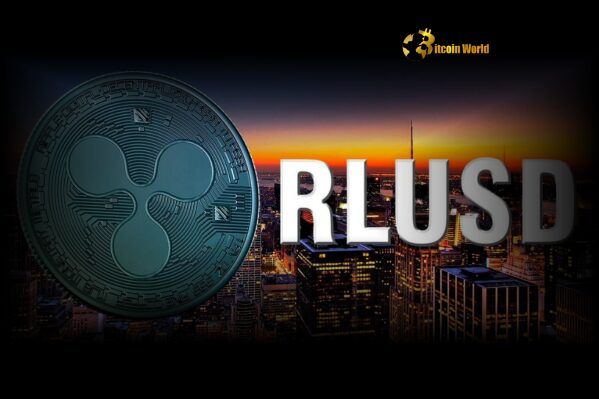BitcoinWorld

Historic: Ripple RLUSD Approved by Dubai Financial Services Authority
In a significant development for the world of digital finance and specifically for blockchain giant Ripple, their stablecoin, RLUSD, has achieved a major milestone. The Dubai Financial Services Authority (DFSA) has granted approval for RLUSD, paving the way for its legal use within the prestigious Dubai International Financial Centre (DIFC). This move underscores Dubai’s growing ambition to become a leading UAE crypto hub and sets a precedent for how digital assets can integrate into traditional financial ecosystems.
What Does DFSA Approval Mean for Ripple RLUSD?
The approval from the Dubai Financial Services Authority is more than just a regulatory green light; it’s a stamp of legitimacy and operational clearance within a highly respected financial jurisdiction. For Ripple, having Ripple RLUSD recognized and permitted by the DFSA allows financial institutions and businesses operating within the DIFC to confidently use the stablecoin for various transactions and services. This includes payments, settlements, and potentially other regulated financial activities.
This approval is crucial because the DFSA operates under a robust regulatory framework, known for its adherence to international standards. Inclusion within this framework signifies that RLUSD has met stringent requirements related to stability, compliance, and operational integrity. It positions RLUSD not just as a digital asset, but as a regulated financial instrument within one of the world’s key financial centres.
Why is the Dubai International Financial Centre (DIFC) Important?
The Dubai International Financial Centre is a special economic zone in Dubai that serves as a leading financial hub for the Middle East, Africa, and South Asia (MEASA) region. It’s home to a vast number of international banks, financial institutions, and fintech companies. Being able to operate within the Dubai International Financial Centre provides direct access to a sophisticated market and a network of established financial players. For a stablecoin like RLUSD, this access is invaluable for adoption and integration into mainstream financial workflows.
Operating within the DIFC means adhering to its specific laws and regulations, which are separate from the rest of the UAE. The DFSA is the independent regulator of financial and ancillary services conducted in the DIFC. Their approval is a specific authorization for activities within this zone, highlighting the targeted approach Dubai is taking towards digital asset integration.
Stablecoin Regulation: A Global Trend and Dubai’s Approach
The regulatory landscape for stablecoins is evolving globally, with jurisdictions grappling with how to classify and oversee these digital assets pegged to stable values like fiat currencies. Effective stablecoin regulation is seen as essential for protecting consumers, ensuring financial stability, and preventing illicit activities.
Dubai, through the DFSA and other authorities like the Virtual Assets Regulatory Authority (VARA), has been proactive in establishing frameworks for virtual assets. The DFSA’s approach within the DIFC often involves adapting existing financial regulations to digital assets, ensuring a level playing field and maintaining market integrity. This approval for RLUSD demonstrates the DFSA’s willingness to engage with and regulate innovative digital financial products, provided they meet necessary standards.
Key aspects of stablecoin regulation often considered include:
- Reserve Requirements: Ensuring the stablecoin is fully backed by reserves that are held safely and transparently.
- Redemption Rights: Guaranteeing users can redeem their stablecoins for the underlying asset at par value.
- Anti-Money Laundering (AML) & Know Your Customer (KYC): Implementing robust procedures to prevent illicit use.
- Governance & Auditing: Establishing clear governance structures and undergoing regular audits of reserves and operations.
The DFSA’s approval suggests RLUSD has addressed these critical regulatory concerns, building trust among potential users and institutions within the DIFC.
Benefits of RLUSD Approval in the DIFC
This regulatory nod opens up several potential benefits for Ripple, the DIFC, and the broader digital asset ecosystem:
For Ripple and RLUSD:
- Increased Legitimacy and Trust: DFSA approval significantly enhances RLUSD’s credibility on a global stage, particularly within institutional finance.
- Access to a Key Financial Market: Direct entry into the sophisticated and well-regulated DIFC ecosystem.
- Potential for Adoption: Financial institutions within the DIFC can now explore using RLUSD for various use cases without regulatory uncertainty within the zone.
- Competitive Advantage: Positions RLUSD favorably among stablecoins seeking institutional adoption in regulated environments.
For the Dubai International Financial Centre:
- Enhancing Fintech Offering: Attracts more digital asset businesses and talent to the centre.
- Facilitating Digital Transactions: Provides a regulated stablecoin option for businesses operating within its jurisdiction.
- Reinforcing Regulatory Leadership: Demonstrates the DFSA’s capability to regulate complex digital assets effectively.
For the Broader Market:
- Model for Regulation: Provides a case study for how other jurisdictions might approach stablecoin regulation within financial hubs.
- Increased Institutional Confidence: Regulatory clarity in a major financial centre can boost overall institutional interest in stablecoins and digital assets.
What are the Potential Challenges or Considerations?
While approval is a major positive step, integrating a stablecoin like Ripple RLUSD into the existing financial infrastructure within the DIFC won’t be without its challenges. These could include:
Integration Complexity: Existing financial systems within institutions need to be adapted to handle stablecoin transactions. This requires technical development and operational adjustments.
Market Education: Despite the approval, educating traditional finance professionals within the DIFC about the practical use cases, benefits, and operational differences of stablecoins compared to traditional assets will be necessary.
Competition: The stablecoin market is competitive. While DFSA approval is a strong differentiator, RLUSD will compete with other digital payment solutions and potentially other stablecoins that may seek or gain similar approvals in the future.
Evolving Regulation: The regulatory landscape for digital assets is still maturing. While the DFSA has provided approval based on current frameworks, future regulatory changes at the local or international level could impact operations.
Examples of Potential RLUSD Use Cases in the DIFC
With DFSA approval, institutions within the Dubai International Financial Centre could potentially leverage RLUSD for several applications:
Cross-Border Payments: Facilitating faster, cheaper, and more transparent international money transfers between entities operating within or connecting with the DIFC.
Trade Finance: Using RLUSD for settlements in trade finance transactions, potentially reducing settlement times and counterparty risk.
Tokenized Assets: Settling transactions involving tokenized securities, real estate, or other assets issued within the DIFC’s regulatory framework.
Fund Management: Providing a stable digital asset for fund managers within the DIFC to use for liquidity management or settlement purposes.
Remittances: While the DIFC is primarily institutional, this approval could indirectly support improved remittance corridors connecting through institutions based there.
These examples highlight how a regulated stablecoin can bridge the gap between traditional finance and the digital asset space, offering efficiency gains and new possibilities.
Actionable Insights for Businesses in the DIFC
For financial institutions and businesses operating within the Dubai International Financial Centre, Ripple’s RLUSD approval presents an opportunity to explore integrating regulated digital assets into their operations. Here are some actionable insights:
- Assess Use Cases: Evaluate where a regulated stablecoin like RLUSD could offer efficiencies or new services in your existing business model (e.g., payments, settlement, treasury management).
- Understand the Framework: Familiarize yourself with the specific DFSA regulations governing the use of RLUSD and other virtual assets within the DIFC.
- Pilot Programs: Consider running pilot programs to test the integration and benefits of using RLUSD in a controlled environment before full-scale adoption.
- Engage with Ripple: Directly engage with Ripple to understand the technical integration requirements and support available for using RLUSD.
- Stay Informed: Keep abreast of further developments in stablecoin regulation within the UAE and globally, as frameworks continue to evolve.
Embracing regulated digital assets early could provide a competitive edge in an increasingly digitized financial landscape.
Dubai’s Vision as a UAE Crypto Hub
This approval for Ripple RLUSD is another clear indicator of Dubai’s strategic vision to become a leading global centre for virtual assets. The emirate has been actively developing comprehensive regulatory frameworks, attracting crypto businesses, and fostering innovation in the blockchain space.
The presence of multiple regulatory bodies like the DFSA (for the DIFC) and VARA (for the rest of Dubai) reflects a nuanced approach to overseeing different aspects of the virtual asset market. By providing regulatory clarity and approval pathways, Dubai aims to attract legitimate businesses and investors while mitigating risks associated with unregulated crypto activities.
The approval of a stablecoin from a major player like Ripple within the DIFC sends a strong signal to the international community that Dubai is serious about integrating digital assets into its financial future in a regulated and responsible manner. This positions Dubai as a forward-thinking UAE crypto hub, ready to embrace the potential of blockchain technology and digital currencies.
Conclusion: A New Era for Digital Finance in Dubai
The approval of Ripple’s RLUSD stablecoin by the Dubai Financial Services Authority marks a significant step forward for both Ripple and Dubai’s ambition in the digital asset space. Allowing RLUSD within the Dubai International Financial Centre provides a regulated pathway for its use by financial institutions, potentially unlocking efficiencies in payments, settlements, and other financial services.
This development underscores the importance of clear stablecoin regulation and highlights Dubai’s commitment to becoming a leading UAE crypto hub. While challenges in integration and market education remain, the DFSA’s approval provides the necessary regulatory certainty for institutions within the Dubai International Financial Centre to explore the benefits of using a regulated stablecoin like Ripple RLUSD. This is a crucial moment in the convergence of traditional finance and the digital asset world, setting a positive precedent for future integrations.
To learn more about the latest stablecoin regulation trends, explore our article on key developments shaping stablecoin regulation institutional adoption.
This post Historic: Ripple RLUSD Approved by Dubai Financial Services Authority first appeared on BitcoinWorld and is written by Editorial Team





